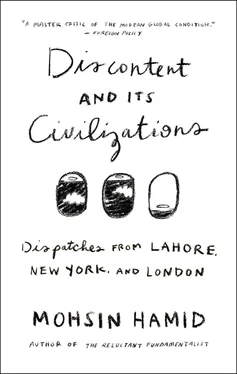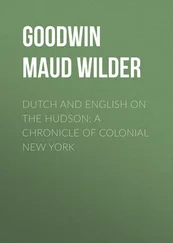When General Zia was blown to bits shortly after my seventeenth birthday in 1988, he wasn’t mourned, at least not by anyone I knew. I left for college in the United States a year later. There I met people who were studying photography and sculpture, and I myself enrolled in classes on creative writing. Without thinking about it, I supposed an education in these “artistic” pursuits was something in which only affluent societies in the West could afford to invest, or, rather, that only the twin luxuries of material success and tolerance of free expression could provide the sort of soil in which an artistic education could thrive.
I was, of course, completely wrong. When I returned to Pakistan in 1993, I was working on what would become my first novel. I thought of writing as a transgressive act. I wrote at night, often from midnight to dawn, and in between writing sessions I would escape into the darkness with my friends. We drove around town in old Japanese cars, hung out on our rooftops, and searched for places beyond the reach of societal control or parental observation. Cheap local booze and even cheaper slabs of hash were the intoxicants of choice in that young urban scene, and avoiding the predations of the bribe-taking police was an alarming and amusing preoccupation.
Increasingly I found my wanderings taking me into the world of the National College of Arts. A couple of my friends were enrolled there, one studying architecture, another graphic design. Others were dating students: painters, printmakers. It was unlike anything I had ever seen. Students of all social classes, and from all parts of Pakistan, attended NCA. The place was a microcosm of Pakistan, but of a creative Pakistan, an alternative to the desiccated Pakistan General Zia had tried to ram down our throats. Here people who prayed five times a day and people who escaped from their hostels late at night to disappear on sexual adventures in the city could coexist. In the studios I saw calligraphy and nudes, work by students with purely formal concerns, and by others for whom art overlapped with politics. I was inspired. I wrote like crazy. I made friends I have kept for life.
Love comes to mind when I think of that time. There was a lot of it going on among the people I hung out with. But I was also falling in love with Pakistan. I have always had a stubborn affection for the land of my birth. When I went abroad for college, I thought I knew it pretty well. But it was my encounters with the denizens of the NCA universe after my return that reminded me that Pakistan is too vast a country to be known, that it is full of surprises, of kinks and twists, of unexpected titillations and empathic connections, of a diversity that can only be described as human. It was exciting and vital and real.
Or rather, they were exciting and vital and real — for my Pakistan had become plural. The art, and artists, I found at NCA ushered me into many more Pakistans: the nascent underground music scenes, the emerging film and television scenes, the scenes of writers like myself, and of course the scenes of other art and other artists, not just in Lahore but in Karachi and Islamabad and elsewhere, and not just in 1993 but in the rest of the nineties, the noughties, and now.
Just a few months ago I was in Amsterdam with two old friends from the Lahore art world. On a warm summer night we checked out some galleries and walked along the canals, whirring bicycles and shrooming teenagers passing us in the darkness. Nothing could have been more different from where we had all been fifteen years earlier. And nothing could have been more similar, either.
(2009)
When Updike Saved Me from Morrison (and Myself)
ONE DAY IN the spring of 1993, Toni Morrison took me out for lunch. It was my last semester at Princeton, and I was in her long-fiction creative writing workshop. I’d done two semesters of short story work with Joyce Carol Oates, and I hoped to be a novelist. So I was writing fast. I think we had to produce thirty or forty or fifty pages for Toni. I’d hit a hundred and was still going.
We sat and chatted and ate (what, I don’t remember, but it included fries). I told her I’d got into law school. I told her I was planning to take time off first, to head back to Pakistan and write. I told her I’d been cooking for myself that year. I told her I made a mean pasta and she ought to give it a try. Really? she said. Yeah, I said. I invited her down to the basement kitchen of Edwards Hall and told her she wouldn’t be disappointed.
To my surprise, she said she’d come. It better not be overboiled spaghetti in some sauce out of a can, she warned me. I smiled. Confident. As we left the restaurant she noticed a paperback hidden between notebooks and printouts in my hands. She asked me what it was. I told her it was Jazz . She asked if it was the first of hers I’d picked up. I confessed it was. She signed it for me. Then she said, Read Beloved , it’s good.
I still remember how she said it: good . Drawn-out. Beautiful and powerful, the way words she spoke often were. When she read our stuff out loud to us in class, it sounded like literature. So I picked up Beloved next. And she was right. It was good.
I thought I was pretty good myself back then. I thought the novel I was writing was good. I thought my cooking was good. I was twenty-one years old and didn’t know better, thank goodness. And luckily for me, Toni never showed up for that pasta.
Instead, I got a message on my answering machine from her assistant. Toni couldn’t make it that day, sadly. John Updike (I think it was Updike) had come to campus. I hadn’t yet read Updike but the name sounded familiar. I called back and said no problem.
It wasn’t until later that it occurred to me my cooking might not have been quite as good as I thought it was. My pasta was indeed spaghetti. It was probably overboiled. And while the sauce didn’t come out of a can, it did come out of a bottle. All I really did was add some hot chilis to it. And maybe a couple of other spices. But maybe not.
Why I was so proud of it, I can’t for the life of me recall.
As for the novel I was writing, I finished a draft for her class. Toni liked it enough to ask me to read from it at the annual end-of-year creative writing event. I still have a manuscript with several pages of her exquisitely fountain-penned suggestions on the reverse. I figured I was almost done.
It wasn’t ready for publication for another seven years.
(2009)
IT WAS WHEN I returned to Pakistan soon after college that a woman introduced me to the pleasures of sweat.
The scene was a religiously inspired, eternally ongoing Sufi dance/trance event. For the uninitiated reader, I would liken this to an open-air rave, but with free admission, and music generated solely by hand drums and bells on the anklets of long-haired male dancers, some of whom were in drag.
As with any rave, the audience included the sick in search of healing, couples desperate for fertility and not a few pot smokers puffing on joints that flavored the air like wands of tuberose.
I had come at ten-thirty because this was when Papu Sain unleashed the kinds of rhythms many believed could take you closer to God.
I was in need of sensual indulgence. At home, a combination of tradition, respect, and the unpopularity of contraceptives meant that any young man returning from college abroad might find himself self-reliant in the act of love to a degree unknown since his dimly recollected boys’ school past.
In my case it would be more honest to blame shyness and bumbling ineptitude. But whatever the cause, I found female companionship limited in those days to my family and the girlfriends of my more fortunate friends. This lack in my life was compounded by a general concealment of the female form itself, Lahore lagging behind New Jersey in the display of skin. Satellite television and imported magazines, with images of women for the most part physically rather unlike those around me, created an ache with no obvious cure in the region.
Читать дальше












